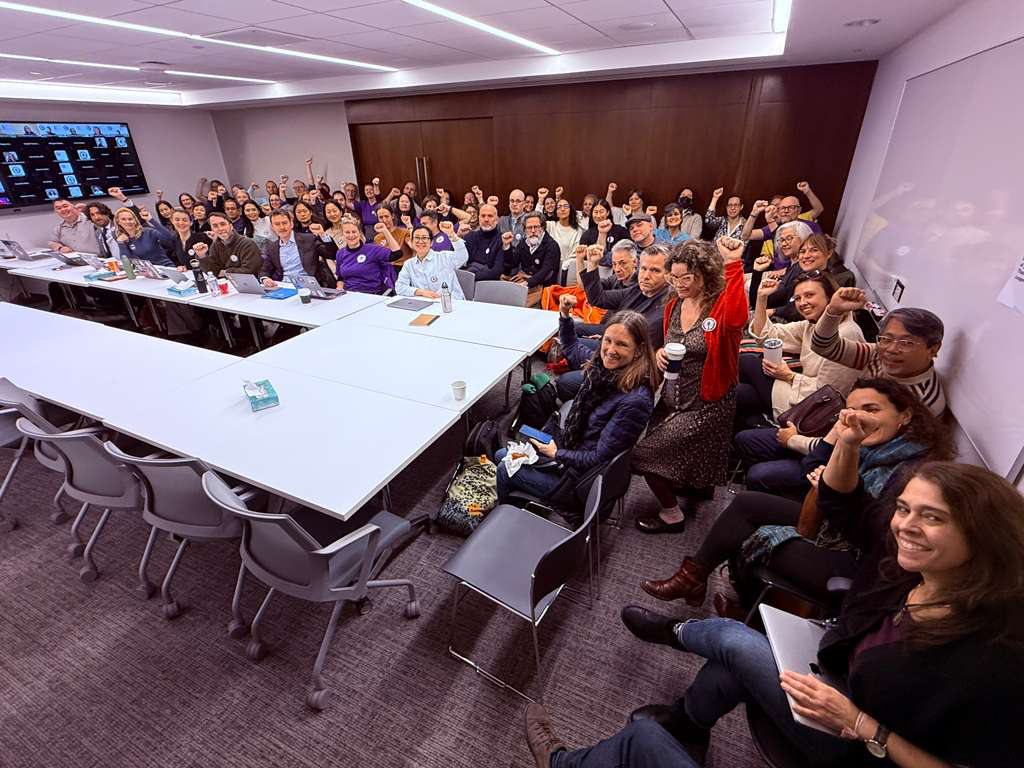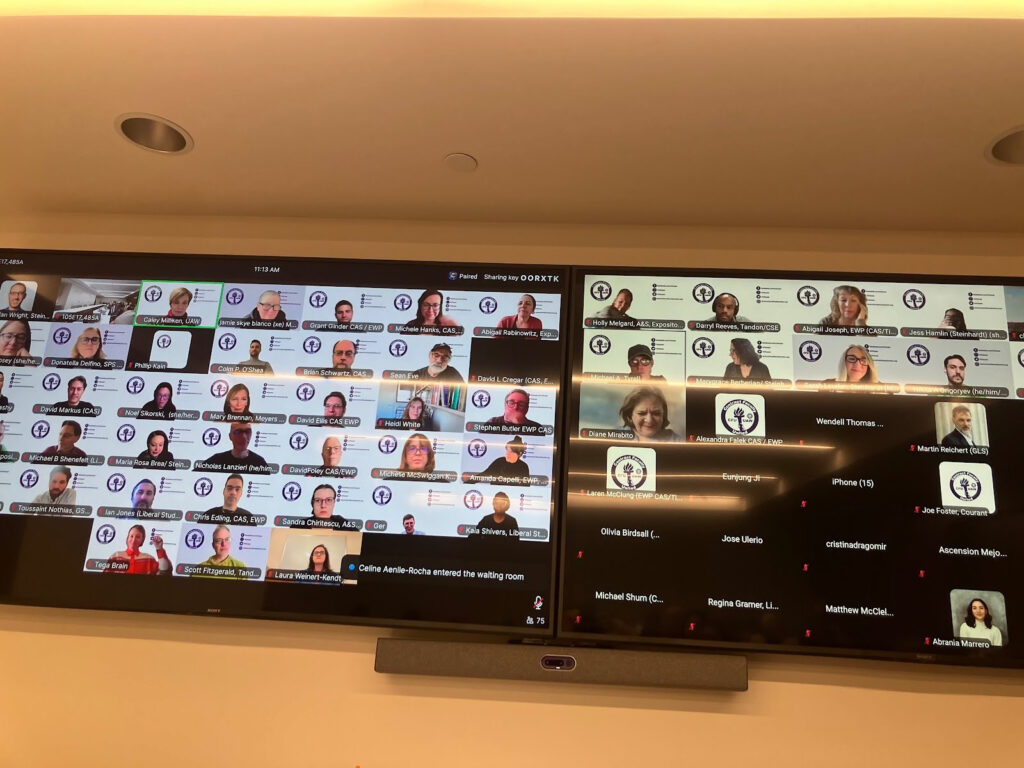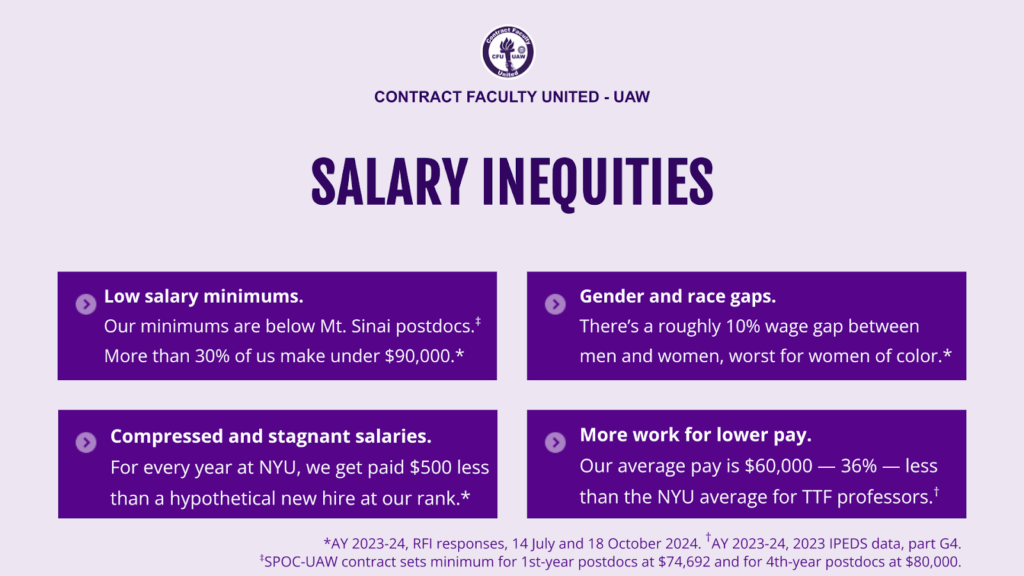Three takeaways from Friday:
-
Big turnout yields big movement: the administration moves when we show up.
-
We’re still fighting for fair pay and fair benefits.
-
The administration still wants to eviscerate peer review and shared governance.
It was another one for the record books: at Friday’s session, contract faculty turned out in never-before-seen numbers — over 70 crammed into the room, and another 110 or so observed on Zoom.

Friday’s lesson is clear: when we expand our organizing efforts and come together in large numbers, the administration moves. We will need to keep doing that, in ever-increasing numbers, to win the strong contract we need and deserve.
The next bargaining session is Tuesday, November 25, from 9-1. RSVP now to come in person or by zoom.
Big Turnout Yields Big Movement
With more than a fifth of our members watching, and knowing that dozens of faculty organizers from departments across NYU participated in workshops about escalating our campaign, the administration’s team knew it had to make movement. And move they did: they came toward us on protections for faculty serving in administrative positions, and they agreed on a committee on technological change that has the authority to review technology prior to its implementation and make recommendations about its use and effects.
They also, for the first time, accepted our demand for presumptively renewable appointments “as a construct,” as the administration’s lead lawyer said several times. While this acceptance is a big victory, we’re still far apart about what that means. We think colleagues who have been successfully reviewed multiple times should keep their jobs absent just cause — a legal standard that means that the administration can only terminate us after progressive discipline, for a good reason, and subject to due process — and that reappointments should be automatic. The administration’s proposal uses the words “presumption of renewal” but they still mean it more like a suggestion. They also continue to insist on a one-year “probationary period” in which we could be fired for any reason at the dean’s whim. But their acceptance of the “construct” showed what we can do when we stand up and fight together.

Since January, we have been demanding a comprehensive article guaranteeing a workplace free from discrimination in which every employee and member of the university community is treated with respect. Here too, while we do not yet have an agreement, we are winning. The administration has proposed a new university-wide anti-bullying policy, and on Friday we gave them a counterproposal that takes much of their proposal and improves it. We believe that after almost a year, we are close.
Last week we won another victory — on behalf of our tenured colleagues. Thanks to a Supreme Court decision called Weingarten, unionized employees have the right to union representation at any meeting that may result in disciplinary action. (If you are called in for such a meeting, be sure to ask for a union rep.) That meant that tenure-track faculty were the only people denied the right to representation at OEO investigatory meetings. This week, after advocacy from the TFSC and CFSC, the administration realized it was untenable to deny tenure-track faculty what we won with our union election, and they agreed to let tenure-track faculty have representation too. The union advantage makes things better for everyone on campus.
Read every proposal and counterproposal on the Bargaining Tracker.
We’re Still Fighting for Fair Pay and Fair Benefits
When we started bargaining more than a year ago, Zohran  Mamdani was there to support us. Later, UAW was the first union to endorse him. Mamdani’s successful campaign highlighted how New York City is increasingly unaffordable, especially for those of us trying to raise a family. We didn’t need a politician to tell us how hard it is to live in New York, but apparently the NYU administration needed to be reminded. So on Friday YOU did just that.
Mamdani was there to support us. Later, UAW was the first union to endorse him. Mamdani’s successful campaign highlighted how New York City is increasingly unaffordable, especially for those of us trying to raise a family. We didn’t need a politician to tell us how hard it is to live in New York, but apparently the NYU administration needed to be reminded. So on Friday YOU did just that.
More than a dozen parent colleagues from across the university shared powerful testimonies about the complex realities of living and working in New York City. A colleague in Liberal Studies described how 65% of her salary goes to childcare, and how NYU’s limited subsidy covers less than one month of care. This was echoed by a mother in Tandon who explained that nearly every dollar of her paycheck will go toward childcare when she returns from leave. Because most of NYU’s modest childcare support ends when children turn four, a College of Nursing faculty member detailed how she and her husband must cobble together friends, neighbors, babysitters, and flexible schedules to cover frequent school closures. A colleague in Global Public Health described how NYU charges more than it provides in subsidies for services at the acclaimed Nordoff-Robbins Center. A parent in FAS described how the only other contract faculty member in her department had to leave NYU because of the crushing costs of raising a family in New York. From Tisch, a parent of two young children spoke about the cycle of taking on extra consulting work to afford childcare, urging NYU to expand backup care and fair pay so faculty can sustain their work and families. Together, these stories make clear that the status quo is not sustainable. We’ve asked the administration to return with a meaningful counterproposal that reflects the real lives of working parents and caregivers across our university.
Not only do we need more money, but we deserve more money. Our teaching alone generates approximately 23% of all tuition revenue at NYU (including the schools where we don’t teach). That was more than $587 million in AY 2023-24. And yet our salaries, in total, make up only 2% of the university’s total salary expenditures. On Friday, we came closer to the administration on salary — decreasing our total plan by $60 million — but held firm where it matters: that any compensation package must address the four major salary inequities we suffer with now:

We also came much closer to them on health, dental, vision, and long-term disability insurance. The administration so far has been insisting on the right to worsen our benefits or make them more expensive whenever they want, as long as they do the same to our tenure-track colleagues. We proposed on Friday to guarantee the status quo: that we will receive the same insurance benefits we do now, for the same cost or less.
But while we came closer to the administration on some parts of salaries and benefits, we held firm on others. A repeated refrain in the testimony from parents was the harm of high rents and long commutes, both to their families and their careers. The administration has been resting on a specious legal argument to refuse to bargain with us over housing, and on Friday we delivered a detailed response about why they are required to bargain with us in good faith over access to faculty housing. We also brought more counterproposals. In Retirement, we held firm on parity with our tenured peers. In Leaves of Absence, we insisted that we deserve a full year of paid leave to bond with young children or take care of ill family members, and that two caregivers who both work at NYU should each be able to take this leave in full. We asked questions about their inadequate proposal on sabbaticals and are reserving a response until they answer. And we are continuing to demand parity with tenure-track peers when it comes to green-card sponsorship, although we have accepted the administration’s structure of a fund for immigration-related expenses.
The administration still wants to eviscerate peer review and shared governance
The administration gave us counterproposals on Appointments and Reappointment, Promotion, and Performance Evaluations that, while coming closer to us in some ways, continue to disregard two important practices that make NYU a leading university: peer review and differences across schools and departments governed by academics. This is a major point of disagreement between us and the administration. In these articles, as their earlier proposals on Workload and Responsibilities and Management Rights, the administration continues to demand that deans have near total discretion and that all 930 of us in more than a dozen schools, divisions, and institutes be judged by the same criteria. They also want to take away the heart of what it means to be a free university: that academics evaluate each other through a system of peer review.
In contrast, we continue to insist that who teaches, what they teach, who is taught, and how it is taught are academic decisions that must be made on academic criteria by academics — that is, by faculty members with academic freedom, not by administrators subject to the whims of donors and politicians. We made that point on Friday in our proposals on Grievance and Arbitration (where we insisted on faculty peer review for grievances related to promotion and reappointment) and Academic Freedom. Because we do the work that keeps NYU working, we know the importance of school and disciplinary difference, and we know that only the faculty working in those schools and departments can properly evaluate each other.
The administration has made it crystal clear: they will need to be forced to accept peer review, shared governance, and academic freedom. We can win the university we need and deserve, but we can only win what we fight for. Your Bargaining Committee can’t win it by ourselves. It will take all of us.
RSVP to observe bargaining Tuesday, November 25, 9am-1pm.
In solidarity,
CFU-UAW BARGAINING COMMITTEE
Richard Dorritie (Rory Meyers College of Nursing)
Elisabeth Fay (Expository Writing Program, Arts & Science)
Robin Harvey (Teaching and Learning, Steinhardt)
Thomas Hill (Center for Global Affairs, SPS)
Peter Li (General Engineering, Tandon)
Benedetta Piantella (Technology, Culture, and Society, Tandon)
Jacob Remes (Gallatin School of Individualized Study)
Chris Chan Roberson (Undergraduate Film & TV, Tisch)
Jamie Root (French Literature, Thought and Culture, Arts & Science)
Fanny Shum (Mathematics, Courant Institute)
Heidi White (Liberal Studies)
